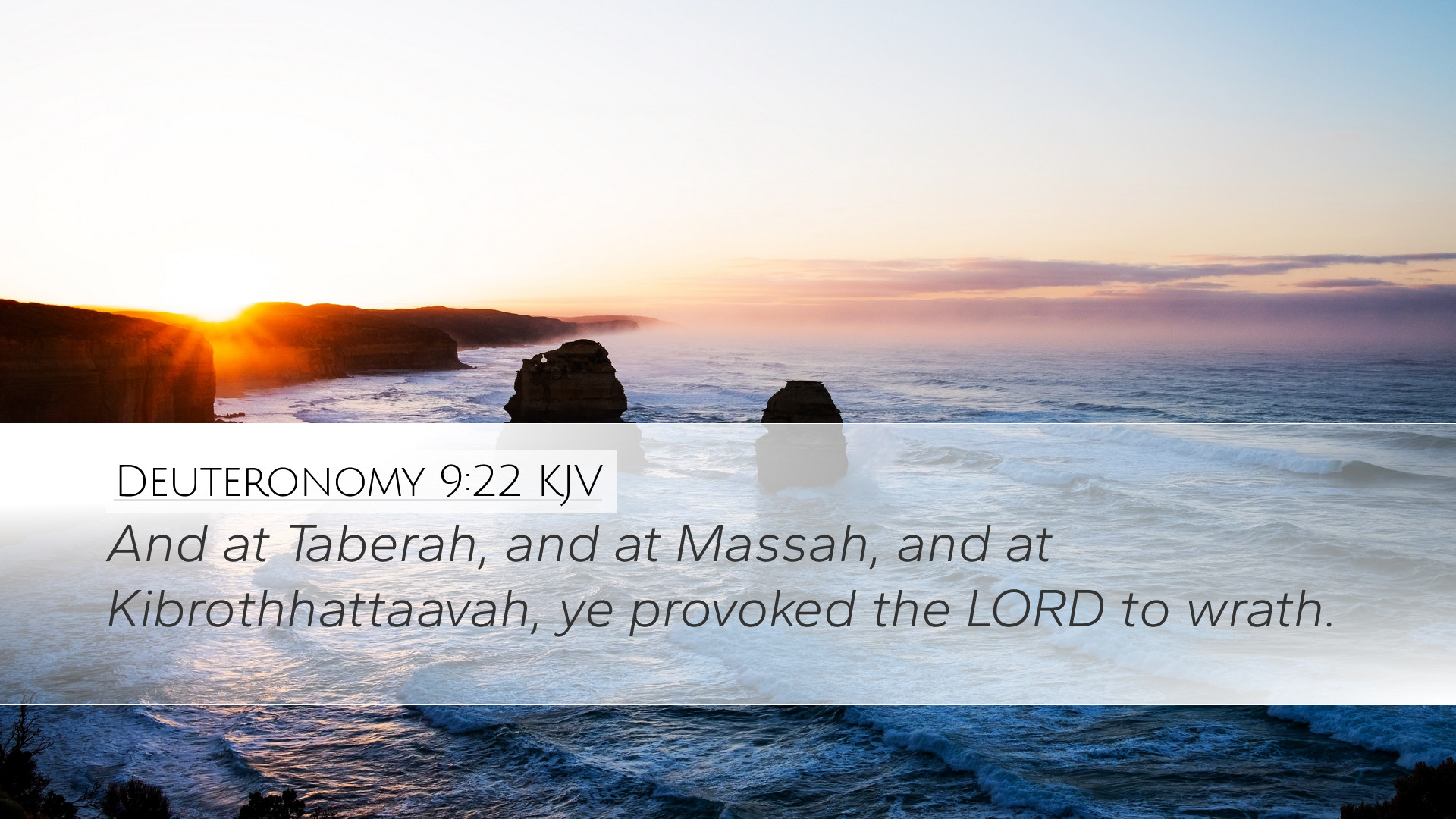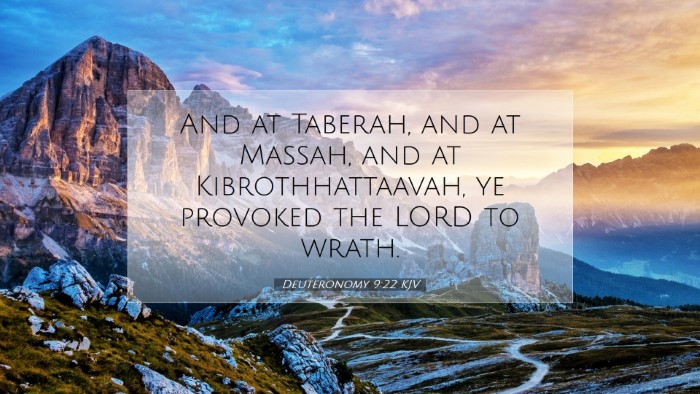Commentary on Deuteronomy 9:22
Verse: "And at Taberah, and at Massah, and at Kibrothhattaavah, ye provoked the Lord to wrath." (Deuteronomy 9:22)
Introduction
Deuteronomy 9:22 is a sobering reminder of the consequences of Israel’s actions during their journey through the wilderness. This verse encapsulates a pattern of disobedience that evokes God’s anger. In this commentary, we will explore various insights from public domain commentaries, elucidating the significance of these events and their implications for God’s chosen people, and for modern readers.
Contextual Overview
The surrounding context of Deuteronomy involves Moses addressing the Israelites, reminding them of their history and God's faithfulness as they prepare to enter the Promised Land. This particular verse refers to three significant incidents: Taberah, Massah, and Kibrothhattaavah. Each event serves as a testament to Israel's recurring struggle with faith and obedience.
Analysis of Key Events
-
Taberah:
This incident is recorded in Numbers 11:1-3, where the Israelites complained about their hardships, leading God to send fire that consumed part of the camp.
Matthew Henry points out that this act of divine judgement was due to their impatience and lack of gratitude, demonstrating how quickly they forgot God's miracles in Egypt.
-
Massah:
Found in Exodus 17:2-7, this event is characterized by the Israelites' demand for water, testing God's patience with their lack of faith.
Albert Barnes emphasizes that their actions at Massah represent a pivotal moment of incredulity, leading to Moses striking the rock instead of speaking to it, which ultimately had serious repercussions (Numbers 20:10-12).
-
Kibrothhattaavah:
This event occurred when the Israelites craved meat and complained against God, leading to a plague that struck them down as they indulged in quail.
Adam Clarke notes that this incident illustrates the dangers of ingratitude and entitlement, resulting in divine discipline due to their excessive lust for earthly pleasures.
Theological Insights
The theological implications of Deuteronomy 9:22 are profound. This verse emphasizes God's holiness and the seriousness of rebellion against Him. The repeated provocations of Israel evoke a passionate response from God, underscoring His commitment to justice. Matthew Henry elaborates on the importance of remembering these events, suggesting that they should serve as a cautionary tale to avoid similar provocations in contemporary faith walk.
Divine Patience and Human Ingratitude: The patterns established through these events illustrate a key aspect of human nature: the inclination towards forgetfulness in the face of divine mercy.
Albert Barnes posits that despite God’s consistent provision, Israel repeatedly surrendered to fear and dissatisfaction, provoking God's righteous anger.
Grace Amidst Disobedience: Despite Israel’s failures, God remained faithful.
Adam Clarke points out that the incidents highlighted in this passage also reveal God's patience and willingness to provide for His people even when they fall short.
This tension between divine justice and mercy is a recurring theme throughout Scripture.
Lessons for Today
For pastors, theologians, and students of the Bible, Deuteronomy 9:22 serves as a reminder of the imperative to remain vigilant against ingratitude and rebellion in our faith journeys.
It invites reflection on the importance of continually recognizing God’s providence and grace in our lives.
-
Gratitude: Regularly remember and express gratitude for the blessings and provisions God has granted, contrary to the Israelites’ tendency to forget.
-
Humility: Recognize our own propensity to stray and provoke God, fostering a spirit of humility and dependence upon His guidance.
-
Accountability: Encourage accountability within the faith community to help each other remain steadfast in faith and obedience.
Conclusion
Deuteronomy 9:22 presents a pointed reflection on human nature and divine response. The historical accounts of Taberah, Massah, and Kibrothhattaavah reinforce the necessity of an attitude of gratitude and obedience towards God. Through these insights gleaned from public domain commentaries, we are reminded of the importance of remembering the past to inform our present and guide our future. May we strive to cultivate a heart that honors God, recognizing His holiness and our need for His grace.


